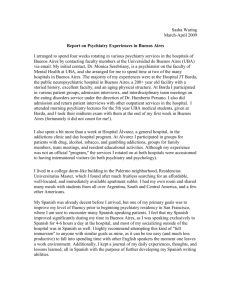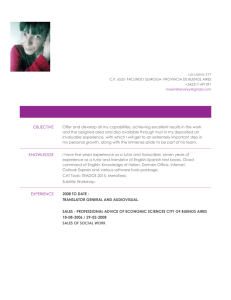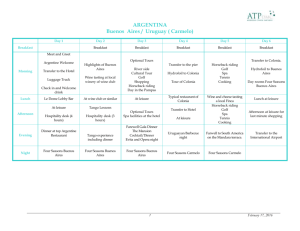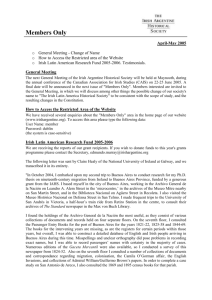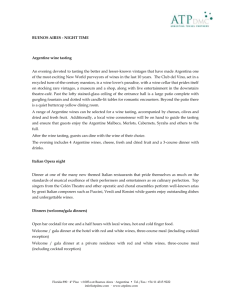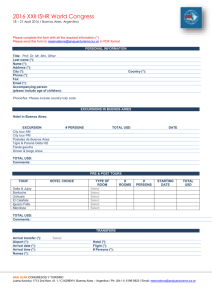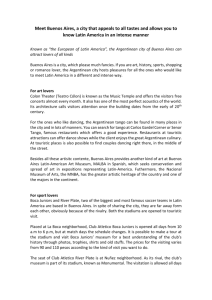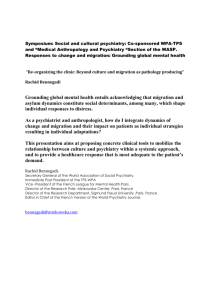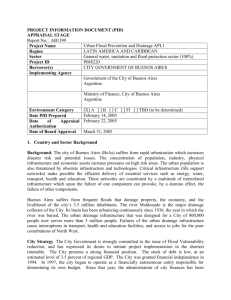Kara Tabor-Furmark - Universidad de Buenos Aires
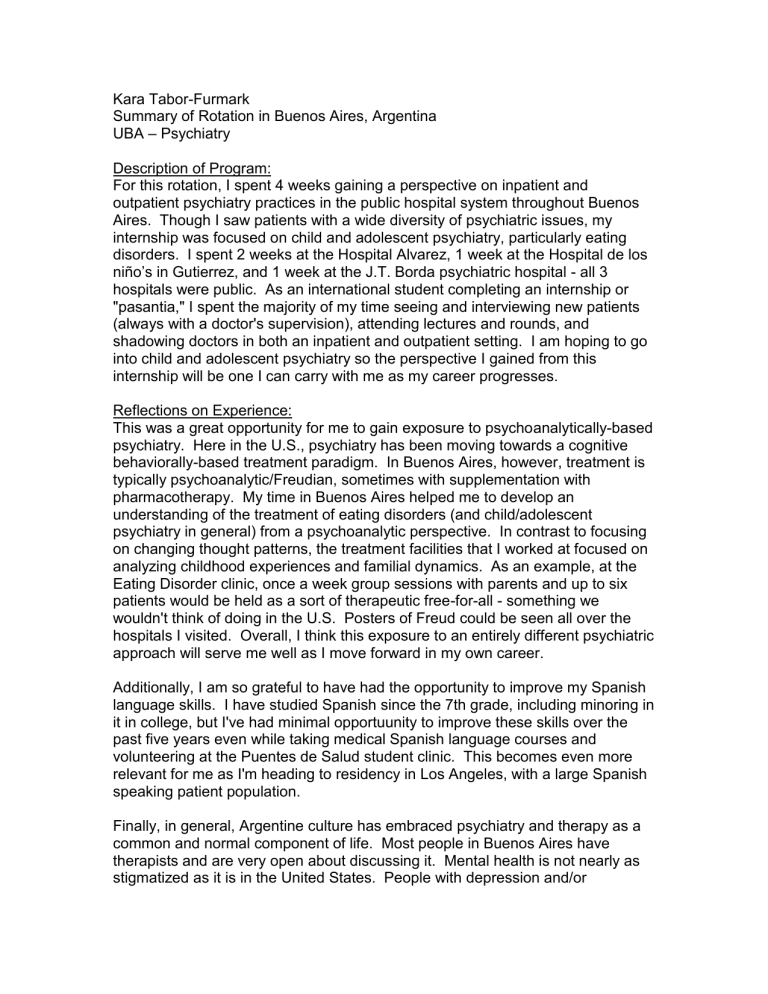
Kara Tabor-Furmark
Summary of Rotation in Buenos Aires, Argentina
UBA – Psychiatry
Description of Program:
For this rotation, I spent 4 weeks gaining a perspective on inpatient and outpatient psychiatry practices in the public hospital system throughout Buenos
Aires. Though I saw patients with a wide diversity of psychiatric issues, my internship was focused on child and adolescent psychiatry, particularly eating disorders. I spent 2 weeks at the Hospital Alvarez, 1 week at the Hospital de los n iño’s in Gutierrez, and 1 week at the J.T. Borda psychiatric hospital - all 3 hospitals were public. As an international student completing an internship or
"pasantia," I spent the majority of my time seeing and interviewing new patients
(always with a doctor's supervision), attending lectures and rounds, and shadowing doctors in both an inpatient and outpatient setting. I am hoping to go into child and adolescent psychiatry so the perspective I gained from this internship will be one I can carry with me as my career progresses.
Reflections on Experience:
This was a great opportunity for me to gain exposure to psychoanalytically-based psychiatry. Here in the U.S., psychiatry has been moving towards a cognitive behaviorally-based treatment paradigm. In Buenos Aires, however, treatment is typically psychoanalytic/Freudian, sometimes with supplementation with pharmacotherapy. My time in Buenos Aires helped me to develop an understanding of the treatment of eating disorders (and child/adolescent psychiatry in general) from a psychoanalytic perspective. In contrast to focusing on changing thought patterns, the treatment facilities that I worked at focused on analyzing childhood experiences and familial dynamics. As an example, at the
Eating Disorder clinic, once a week group sessions with parents and up to six patients would be held as a sort of therapeutic free-for-all - something we wouldn't think of doing in the U.S. Posters of Freud could be seen all over the hospitals I visited. Overall, I think this exposure to an entirely different psychiatric approach will serve me well as I move forward in my own career.
Additionally, I am so grateful to have had the opportunity to improve my Spanish language skills. I have studied Spanish since the 7th grade, including minoring in it in college, but I've had minimal opportuunity to improve these skills over the past five years even while taking medical Spanish language courses and volunteering at the Puentes de Salud student clinic. This becomes even more relevant for me as I'm heading to residency in Los Angeles, with a large Spanish speaking patient population.
Finally, in general, Argentine culture has embraced psychiatry and therapy as a common and normal component of life. Most people in Buenos Aires have therapists and are very open about discussing it. Mental health is not nearly as stigmatized as it is in the United States. People with depression and/or
schizophrenia, for example, will openly admit it to their friends, families, even strangers - and from my (albeit limited) exposure to these patients, they seem to fare a lot better. Discussions with some of the doctors about this makes me think that a large part of these improved outcomes may be partially due to the social structure inherent to Argentine society - wherein children live with their family until age 30 or beyond - and continue to derive support from their parents and extended family throuhout their lives. This certainly has given me a lot to think about, and I'm sure it will influence how I view and treat my patients as my career progresses. As an example, I now view familial participation in treatment as paramount in helping child and adolescent (even adult) patients with mental illness.
Suggestions to Improve the Rotation:
I had a wonderful time in Buenos Aires during this rotation. All of the doctors I worked with were so open to having me, and so incredibly helpful. They went out of their way to ensure that I was having a good experience - giving me rides to the hospital, offering sight-seeing suggestions, constantly checking in to make sure I was enjoying myself. Perhaps the most educationally beneficial experience was the week I spent at the J.T. Borda psychiatric hospital with Dr.
Humberto Persano. He was a great teacher, and so passionate about the program he heads at the hospital, which centers on an inter-disciplinary approach to the treatment of eating disorders. My critique would be that it would have been great to spend more time at the Borda. Because of the schedule that was worked out for me (arranged by the Universidad de Buenos Aires), I was only able to spend a week there (in addition to 2 weeks at the Hospital Alvarez and 1 week at the Hospital de los niño’s).
My time at the Alvarez was also really educational and interesting - the doctors I worked with there were really great teachers, and I got to see both inpatient and out patient psychiatry. At the Hospital de los niño’s, however, my experience was mostly lecture-based. The lectures were interesting, but it would have been nice to have a bit more clinical experience at this hospital. The issue was that there were fewer patients and more residents being trained there, so resources were extremely limited in terms of bedside contact.
Recommendations to future participants:
Buenos Aires will treat you so well - it's a hugh, sprawling, cosmopolitan city with a Latin way of life. I would recommend living in the Palermo area - either
Palermo Hollywood, Chico, or Soho. I've heard Recoleta is also nice to live in, but it's more expensive. In general, you will get what you want out of this rotation. All of the doctors I worked with were receptive to any requests I had, and they were always more than happy to go out of their way to ensure I was having a good experience (e.g. rides to the hospital, interesting talks, cool clinical/shadowing opportunities). That being said, make sure you take the initiative to ask when you need help with something or are presented with an opportunity you'd be interested in. I had difficulties navigating the public bus
system, for example, and ended up going to the wrong hospital for the first day of the rotation. Make sure to email/call when you need clarification.
In terms of safety, Buenos Aires is not as dangerous as other Latin American cities, but always be cautious of your possessions - particularly any iPhones or electronics, as those are hot ticket items in BA. I would be especially conscious of this on the bus/subte. If you're a female, be aware that Argentinean men are aggressive and forward, but this won't usually amount to anything other than cat calls. Again, just be aware of your surroundings and don't be lulled into a sense of false security because BA is more developed than other Latin American countries. As an American, you will likely stand out -- don't forget that you are a foreigner and people recognize this.
For cellphone use, I kept my American phone and used iPhone apps including
Skype and VIBER to call home. If I were staying longer, I would have considered getting an Argentine cell phone but it didn't make sense for me because I was only there for 4 weeks. As a weekend trip, Iguazu falls is incredible - I highly recommend it. And as ridiculous as an 18 hour bus ride sounds, it really isn't so bad. Mendoza and Bariloche would have been great trips had I had more time.

